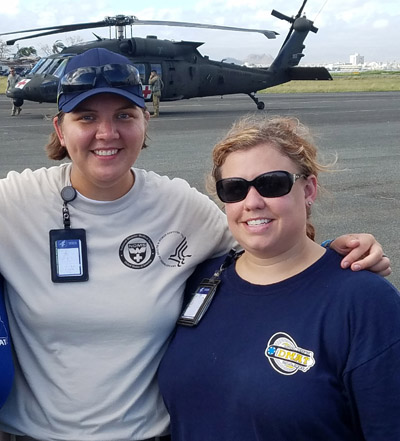BJH Nurses Endure Cold Showers, MREs and Sweltering Heat to Help Hurricane Victims
Each year, BJC and its employees support dozens of causes, many of them near and dear to the heart for employees and their loved ones. Here is an example of that support.
Travel to an exotic Caribbean island where you can swelter in 100-degree heat, feast on military-style rations and clean up in cold showers. This sounds like the worst-ever advertisement for a travel destination, but it aptly describes what two Barnes-Jewish Hospital nurses said yes to when they recently traveled to Puerto Rico as part of a medical mission.
 As members of the National Disaster Medical System (NDMS), BJH nurses Melissa Schmidt, RN, MSN, ACCNS-AG, and Leslie Echterhoff, RN, BSN, CMSRN, deployed to Arecibo, Puerto Rico, for 22 days to support the hospital and community there in the aftermath of Hurricane Maria.
As members of the National Disaster Medical System (NDMS), BJH nurses Melissa Schmidt, RN, MSN, ACCNS-AG, and Leslie Echterhoff, RN, BSN, CMSRN, deployed to Arecibo, Puerto Rico, for 22 days to support the hospital and community there in the aftermath of Hurricane Maria.
NDMS’ specific mission was to support the staff of Pavia Arecibo Hospital as they cared for patients in a tent set up next to the hospital. Eight patients had to be evacuated from the hospital’s top floor, where a lack of air conditioning caused temperatures to reach 112 degrees. The tent’s census eventually grew to 12.
“Our mission was to maintain the ‘infrastructure’ so the staff could do its job,” says Schmidt. “That meant having a command center-type mentality, ensuring there was a reliable supply of commodities like electricity, oxygen, medications, supplies and sanitation.”
As nurses on BJH’s 11300 neurosciences unit, both nurses have their share of tough days and difficult cases, but their deployments have taught them to appreciate the amenities we often take for granted. Responding to disasters like Maria, the NDMS team must endure most of the conditions experienced by the locals. In the case of Arecibo, that meant limited electricity and air conditioning, rationed food and water, and limited supplies on store shelves with everyone operating on a cash-only basis.
Schmidt, a clinical nurse specialist, clicks off her previous disaster deployments — hurricanes Gustav and Harvey, the Joplin tornado and the 2010 Haiti earthquake — which she classifies as her toughest assignment.
She signed up for NDMS in 2007 on the suggestion of her mother, who works for FEMA.
Schmidt says a desire to help people when they are most vulnerable and a sense of adventure drew her to apply for NDMS.
“On deployment, we like to say we don’t know what’s next, we only know what we’re doing right now,” she says.
In Arecibo, Schmidt and Echterhoff say they felt fortunate to be housed in unused hospital rooms during their deployment, where they slept on mattresses instead of a cot. Food most days was a choice of four MREs (meals ready-to-eat), although they were able to procure some Subway sandwiches and pizza near the end of their deployment. Showers were “military style” — rationed to three minutes using cold water.
This was Echterhoff’s first deployment. She characterizes the experience as “eye-opening,” one that gave her an appreciation for the amenities most Americans enjoy every day.
“After returning, my attitude has pretty much been, I have food, water and a roof over my head, so this is going to be a good day,” she says.
Both nurses say a surprising but gratifying part of the trip was witnessing the resiliency of Puerto Ricans living in difficult conditions and their hospitality to the NDMS team.
“Especially when we went on ‘strike missions’ to do pop-up clinics in the community, the residents were so happy to see us, they routinely offered us food or drinks, when they were struggling to feed themselves,” says Echterhoff.
At a clinic in the town square, residents set up a picnic tent to shelter the NDMS team. When the team was checking in on a community nursing home, one family offered them a hot lunch.
“We were reluctant to accept, but it was absolutely delicious,” says Echterhoff.
Several other clinicians within the Washington University Medical Campus also are NDMS employees. NDMS is a federal program directed by U.S. Health and Human Services that provides medical support following disasters and emergencies. Clearing the application process can take one to two years, while the agency performs all of the necessary background checks.
Because Puerto Rico is experiencing a lengthy recovery from Maria, Schmidt and Echterhoff have been told they may re-deploy there in November.
10261